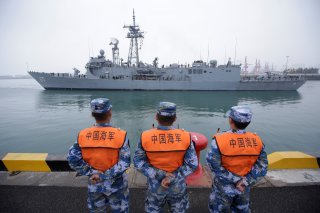How China Is Slow Conquering the South China Sea
The Chinese government has consistently built-up false assurance by presenting a façade of commitment to peace, harmony and moral principle. Additionally, the dependence of regional countries on Chinese trade and investment puts Beijing in a position to dictate compliance.
These same features are visible in Chinese foreign policy outside of the South China Sea: assurances that China is committed to peace and justice; official Chinese denial of criminal behavior or policies that harm other countries; swarming tactics and laser attacks on and above the East China Sea; and Chinese economic coercion to punish other countries for challenging Beijing’s positions on issues such as Taiwan, CCP governance, China’s privileges as a big country, and the arrest of Huawei executive Meng Wanzhou.
Changing the trajectory of the trend in the South China Sea would require more of the region to decide that the long-term risk of de facto Chinese ownership of this important waterway outweighs the short-term risk—both military and economic—of taking a stronger stand against Chinese encroachment. If it chose to, the United States could play a uniquely constructive role: First, by taking the lead in opposing Chinese actions that contravene the Law of the Sea and the 2016 Permanent Court of Arbitration decision; and second, by championing an effort to formulate a comprehensive settlement of the South China Sea disputes that would at a minimum call out and isolate China rather than allowing Beijing to prevail by skillfully exploiting international inattention. Otherwise, the region is betting that China will not use its control of the South China Sea to promote its self-interest and punish its opponents.
Denny Roy is a senior fellow and supervisor of the POSCO Fellowship Program, Research Program at the East-West Center. Roy has written on Chinese foreign policy, the North Korea nuclear weapons crisis, China-Japan relations, and China-Taiwan relations.
Image: Reuters

